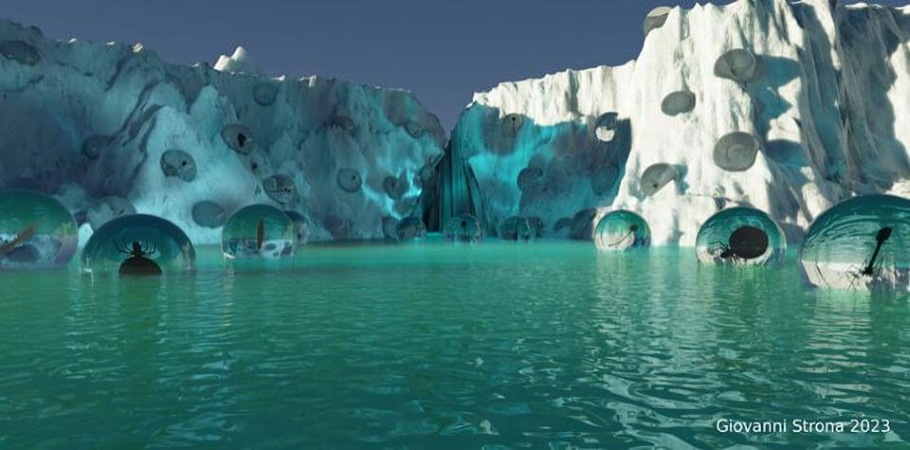Ancient Viruses From Melting Ice Are Reawakening
Author: Flinders University
Published: 2023/07/27
Publication Details: Peer-Reviewed, Simulation / Modelling
Category Topic: Climate Change - Related Publications
Page Content: Synopsis - Introduction - Main
Synopsis: The release of only 1% of dormant pathogens could cause major environmental damage and widespread loss of host organisms worldwide. While melting glaciers and permafrost risk the re-emergence of many types of dormant pathogens, the potential destruction to modern ecosystems posed by these microbes has been difficult to predict.
Introduction
Climate change could hasten the release of 'time-travelling' pathogens from melting permafrost and ice that have been trapped for millennia. Their emergence increases threats to the global environment and even humanity itself.
Main Content
While melting glaciers and permafrost risk the re-emergence of many types of dormant pathogens, the potential destruction to modern ecosystems posed by these microbes has been difficult to predict.
But a new global study by Dr Giovanni Strona of the European Commission Joint Research Centre and Matthew Flinders Professor of Global Ecology Corey Bradshaw from Flinders University in Australia, published today in the open-access journal PLOS Computational Biology, has calculated the ecological risks posed by the release of these unpredictable ancient microbes.
The researchers constructed simulated experiments where digital pathogens from the past invade communities of bacteria-like hosts. They compared the effects of the invading pathogens on the diversity of host bacteria to those in communities where no invasions occurred.
The researchers found that in their simulations, the ancient invading pathogens could often survive and evolve in the modern world, and about 3% became dominant in their new environment.

About 1% of those invaders presented unpredictable results - some caused up to one third of the host species to die out, while others increased diversity by up to 12% compared to the simulations where escape was not permitted in the simulations.
The risks posed by this 1% of released pathogens might seem small, but given the sheer number of ancient microbes regularly released into modern communities, the researchers say these outbreaks represent a substantial danger.
"The scientific debate on the topic has been dominated by speculation, due to the challenges in collecting data or designing experiments to elaborate and test hypotheses. For the first time, we provide an extensive analysis of the risk posed to modern ecological communities by these 'time-travelling' pathogens through advanced computer simulations," says lead author Dr Giovanni Strona.
"We found that invading pathogens could often survive, evolve and, in a few cases, become exceptionally persistent and dominant in the community, causing either substantial losses or changes in the number of living species. Our findings therefore suggest that unpredictable threats so far confined to science fiction could in reality pose serious risk as powerful drivers of ecological damage."
Flinders University Professor Corey Bradshaw says the new findings show that the risk of invasion of unknown 'black swan' pathogens that can cause irreversible damage is not negligible.
"From that perspective, our results are worrisome, because they point to an actual risk deriving from the rare events where pathogens currently trapped in the permafrost and ice produce severe ecological impacts. In the worst, but still entirely plausible case, the invasion of a single ancient pathogen reduced the size of its host community by 30% when compared to our non-invasive controls."
"As a society, we need to understand the potential risk posed by these ancient microbes so we can prepare for any unintended consequences of their release into the modern world. The results tell us that the risk is no longer simply a fantasy that we shouldn't be prepared to defend against."
The researchers used Avida, an artificial-life software platform developed by Michigan State University, to construct and test the simulated release of the digital pathogens into biological communities.
Attribution/Source(s): This peer reviewed publication was selected for publishing by the editors of Disabled World (DW) due to its relevance to the disability community. Originally authored by Flinders University and published on 2023/07/27, this content may have been edited for style, clarity, or brevity.